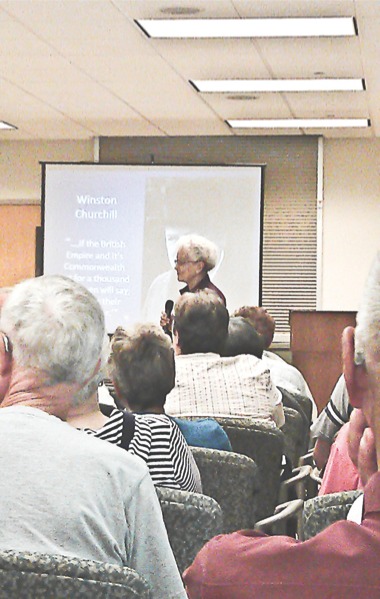SUN CITY – A young Joy Aavang sat in the bomb shelter at her school, along with her apprehensive classmates as the headmaster entered the room.
“He came in, and he said, ‘Okay, children, listen. The factory was hit, and some of you have parents there,'” Aavang said. “And he said, ‘As soon as this all clear goes, then you can go home, those of you with somebody at the factory.'”

WWII survivor Joy Aavang (standing) shares her experiences with the Sun City’s Historians Club. (Photo by Mason Souza/Sun Day)
Aavang’s parents were not at the factory, but this was the tense, grim world she lived in as a youth in England during the air raids by the German Luftwaffe, or air force, during World War II.
Restless sleep in bomb shelters, taking cover at a moment’s notice, and living with food and clothing rations were all part of Aavang’s world during those years.
Now a resident of Woodstock, Aavang told the story of these years at a meeting of the Sun City Historians Club on May 18.
Aavang was raised by her grandparents, who took her in at three months old. They, along with her uncle, whom she saw as a brother, helped each other to remain positive through this most treacherous of times.
“It doesn’t matter how bad things get, look for something funny, and if you can laugh, you can get through anything,” Aavang said, quoting her grandfather.
In addition to her family, Aavang had a teacher, Mr. Miller, for two years at the beginning of the war. Miller made such a strong impact on Aavang that she continued to write to him long after she had graduated.
“I just thank my lucky stars that I was in that particular class when war broke out,” she said.
Perhaps Aavang’s fondest memory of Mr. Miller was him standing at the steps at the entrance to the school’s bomb shelter, reading from the “Biggles” series of books.
“Biggles” focused on fictional pilot James Bigglesworth of the Royal Flying Corps, serving in both World Wars. It’s easy to see why the books may have had a strong resonance in Aavang and the other students.
A young Aavang felt her world crumble the day her grandmother suggested that she board a ship to Canada with other evacuees to go live with her mother.
“I cried and made myself sick,” Aavang said.
Of course, Aavang’s grandmother was only trying to keep her safe. Still, Aavang protested more, until her grandmother decided to hold off on the decision.
Not long after the proposal for Aavang to flee did she and her family learn just how big of a decision it was.
“Grandma was reading the paper, and all of a sudden this mild sweetheart of a lady throws the paper down on the floor and she said, ‘That does it. She’s never going anywhere; she’s staying right here with us,'” Aavang said.
“And I’d never seen her get angry, and I looked at my granddad, and he looked at me, and I just sat there. And finally he said, ‘Okay, well what brought that up?'”
The two looked at the discarded newspaper. It bore the news that the S.S. City of Benares, a ship carrying 90 children to Canada – the same ship that Aavang would have boarded, was sunk by a torpedo fired by a German U-boat.
Aavang would escape near tragedy again as a young adult. After school, she worked for the insurance company Lloyd’s of London. She only remembers brushing her hair during one foggy morning.
“All I remembered was standing by the window thinking, Why is it lightning when it’s so foggy?” Aavang said. “The next thing I knew, I was on the other side of the room picking myself up, and I haven’t heard right since.”
The blast that threw Aavang was from a new weapon: the V2 rocket. Developed by Nazi Germany, this rocket, unlike its predecessors, could travel faster than the speed of sound, making early detection of one extremely difficult.
A distinguishable tone of reverie came over Aavang as she spoke of England’s heroes in the war. Prime Minister Winston Churchill, the royal family, and pilots of Spitfire fighter aircraft all were given due mention in Aavang’s presentation.
Right alongside them were Aavang’s grandparents, uncle, teachers, and friends, each tied together not only by the trials of war, but the common courage that helped them see to its end.




